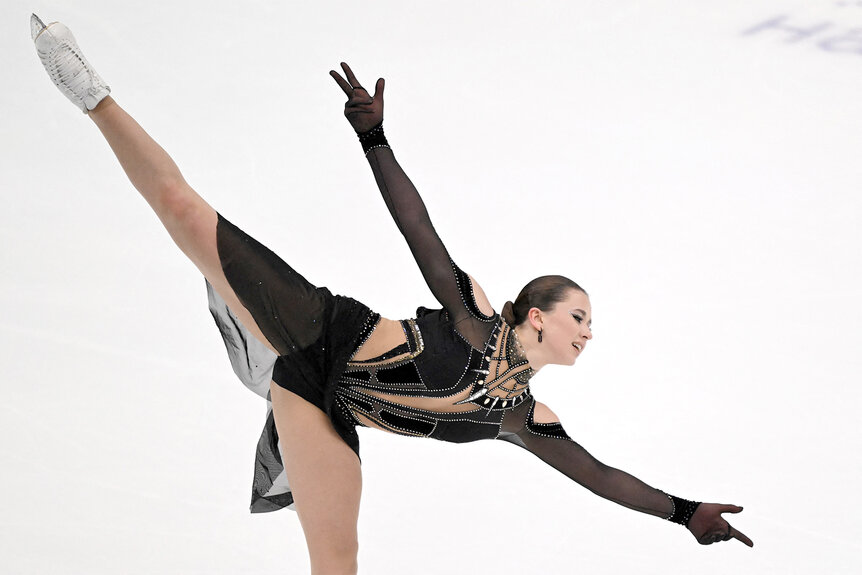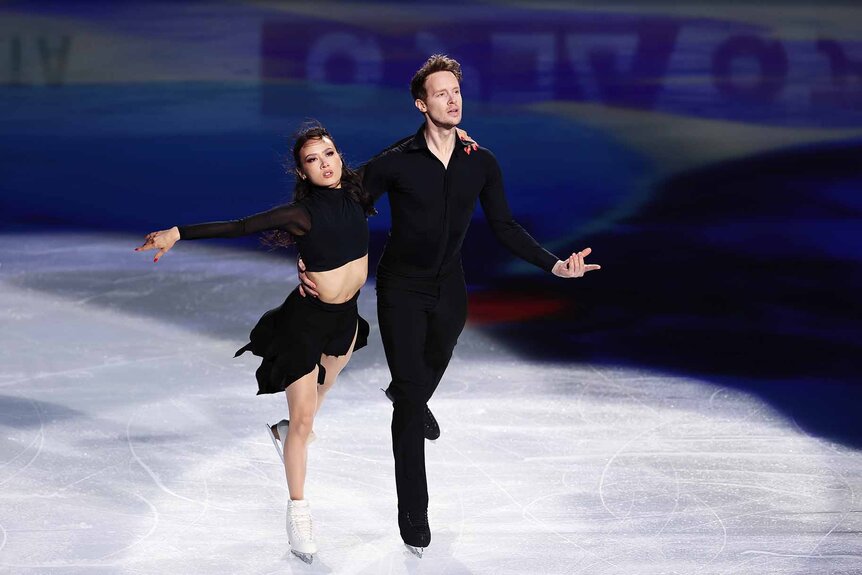Create a free profile to get unlimited access to exclusive show news, updates, and more!
Team USA Figure Skaters Awarded Olympic Gold 2 Years After Kamila Valieva Doping Scandal
The now-17-year-old Russian figure skater was slapped with a backdated four-year ban after it was discovered she used trimetazidine before the 2022 Winter Games.
Russian figure skater Kamila Valieva has been stripped of her 2022 Olympic gold medal following a two-year investigation into doping allegations, meaning Team USA will be awarded the honor.
The Court of Arbitration for Sport (C.A.S.) in Switzerland announced Tuesday that Valieva, now 17, violated anti-doping statutes when competing in the 2022 Winter Olympics in Beijing, according to a ruling published by the International Skating Union (I.S.U.). The findings mean Valieva will be banned from the sport for four years, a prohibition which will be retroactively applied to December 21, 2021, thus making her 2022 Olympic win a win no more.
Valieva will also be stripped of other victories during the four-year ineligibility period, including her fourth-place ranking in the 2022 Olympic Games in Women’s Singles and placing first in the 2022 I.S.U. European Championships in the same category.
RELATED: Meet the Figure Skaters Competing at the 2024 Prevagen U.S. Figure Skating Championships
“The I.S.U. welcomes the decision of C.A.S. and firmly maintains its position that the protection of clean athletes and the fight against doping are of the highest priority and will persist in the ongoing effort to uphold the integrity of fair competition and the well-being of athletes,” the I.S.U. stated.
Team USA Gets the Gold
Team USA, previous silver-medal winners, will now be handed the 2022 gold medal by the International Olympic Committee (I.O.C.), though a date for the award ceremony has yet to be scheduled, per NBC Sports. The athletes are Nathan Chen, Karen Chen (no relation), Vincent Zhou, and ice-dancing pairs Madison Chock and Evan Bates, Madison Hubbell and Zachary Donohue, and Alexa Knierim and Brandon Frazier.
On Monday evening, before the I.S.U. announced their findings, the I.O.C. sent word to the US Olympic and Paralympic Committee (U.S.O.P.C.) that they were “now in position” to award Team USA with the gold, per an e-mail obtained by The Associated Press. The final say by the I.S.U. — which overlooks the games’ results — came the next day.
In Monday’s e-mail, the I.O.C. said they welcomed “clarity in the case” and were grateful Team USA would receive gold, “for which they have been waiting so long,” per NBC Sports.
“We have great sympathy with the athletes who have had to wait for two years to get the final results of their competition,” the I.O.C. stated, in part.
It's likely that Japan, who placed third, will now go on to earn the silver medal, but there was initial uncertainty over who would advance for the bronze medal. It came down to Russia and Canada, and despite Valieva's disqualification affecting Team Russia's overall score, the I.S.U. stated Russia still scored high enough to get bronze even without Valieva's win, leaving Canada in fourth, according to NPR.
For the 2022 I.S.U. European Championships, Russian figure skater Anna Shcherbakova will inherit first place, with Russia’s Alexandra Trusova in second, and Belgium’s Loena Hendrickx in third, per I.S.U.’s statement.
Kamila Valieva and Doping Allegations
On Christmas Day in 2021, the then-15-year-old athlete failed a urine test submitted to the Russian National Championships, according to The New York Times, where she debuted in the seniors event and ultimately placed second. The results, however, were not discovered by Russian overseers until February 7, days into the 2022 Winter Olympic Games and six weeks after the dirty urine sample was submitted.
The sample tested positive for a heart medication called trimetazidine, commonly known as “TMZ.” NBC Olympics reported that the non-F.D.A.-approved drug has been used to treat conditions such as angina, increasing blood flow to the heart and limiting rapid swings of blood pressure.
The World Anti-Doping Agency (W.A.D.A.) categorizes trimetazidine as a “hormone and metabolic modulator,” and it has been banned since 2014.
It remains unclear whether Valieva was aware that taking the medication violated the All-Russian Anti-Doping Rules (the Russian A.D.R.) and the I.S.U.
The discovery of Valieva’s urine sample sent the figure skating community into an uproar, and governing sports authorities in Russia led appeals against the C.A.S. in hopes of not banning Valieva on account of her being a minor, per The Associated Press. The timeline of events also came under scrutiny, with many questioning why it took six weeks to learn about the test and another two years to get a ruling.
Over the weekend, Olympic winner Evan Bates shared his frustration in anticipation of the recent ruling, per NBC Sports.
“I think two years is too long for this decision to be made, and we may never know why it’s taken so long,” said Bates. “We’re just really looking forward to getting some closure.”
RELATED: Lifts, Jumps and A Death Spiral: How To Watch The 2024 U.S. Figure Skating Championships
Response to the Recent Ruling
U.S.O.P.C. CEO Sarah Hirshland called the decision “a significant win” for both Team USA and athletes worldwide “who practice fair play and advocate for clean sport,” according to NBC Sports.
“We now anticipate the day when we can wholeheartedly celebrate these athletes, along with their peers from around the world,” Hirshland stated. “Their moment is approaching, and when it arrives, it will serve as a testament to the justice and recognition they deserve.”
Leading up to the scandal, Valieva was an up-and-coming prodigy in the world of figure skating. Prior to debuting in the senior competitions in 2021, the teen won the women’s singles category at the 2020 Junior World Championships in Tallinn, Estonia, and the 2019-2020 Junior Grand Prix Finals in the same category in Turin, Italy.
In light of the recent ruling, the W.A.D.A. came forward to rebuke enhancement drugs in minor athletes, per CNN.
“The doping of children is unforgivable,” they stated. “Doctors, coaches, or other support personnel who are found to have provided performance-enhancing substances to minors should face the full force of the World Anti-Doping Code.”
International anti-doping laws often show leniency if users are under 16 years of age. But since Russia’s anti-doping agencies do not discriminate against age, the C.A.S. imposed its verdict no differently than if Valieva was an adult competitor.
In December 2022, the Russian Anti-Doping Agency (R.U.S.A.D.A.) said they found no “fault or negligence” by Valieva, claiming she ingested the drug accidentally, a claim appealed by the I.O.C. and I.S.U., according to CNN.
Should Valieva’s camp choose to appeal, they have 30 days to bring the case to the Swiss Federal Tribunal.




















